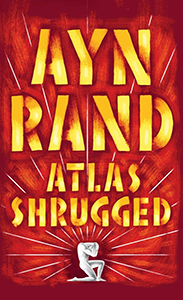Atlas Shrugged
“Atlas Shrugged” is a novel written by Ayn Rand, first published in 1957. It is a philosophical and political work that explores Rand’s philosophy of Objectivism through a narrative that combines elements of dystopia, science fiction, romance, and thriller. Here’s a summary of the key themes and plot elements of the book:
Plot Summary:
Setting:
– The novel is set in a dystopian United States where government intervention and regulations have stifled innovation, entrepreneurship, and individual freedom. Society is crumbling as businesses collapse and productive individuals disappear.
Characters:
– The story revolves around several key characters, notably Dagny Taggart, a capable and driven railroad executive who struggles to keep her family’s railroad company afloat amidst economic decline. Other prominent characters include Hank Rearden, a steel magnate who invents a revolutionary metal alloy, and John Galt, an enigmatic figure who plays a pivotal role in the narrative.
Conflict and Decline:
– As the novel progresses, the protagonists face increasing challenges from government interference, corruption, and collectivist ideologies that undermine individual achievement and prosperity. The most productive members of society, including inventors, entrepreneurs, and intellectuals, begin to disappear under mysterious circumstances.
John Galt’s Role:
– John Galt emerges as a central figure who embodies the philosophy of Objectivism and leads a strike of the mind—the most productive individuals in society withdrawing their talents and contributions in protest against collectivism and exploitation. Galt’s strike, symbolically referred to as “going on strike” or “stopping the motor of the world,” aims to demonstrate the indispensable role of individual creators and thinkers in a flourishing society.
Themes:
– “Objectivism”: Ayn Rand’s philosophy of Objectivism is central to the novel, advocating for reason, individualism, and capitalism. The novel critiques collectivism and altruism while championing rational self-interest and the pursuit of personal happiness.
– Individualism vs. Collectivism: The novel contrasts the individualist values of productivity, independence, and personal achievement with the collectivist ideals of sacrifice, altruism, and state control.
– Economic and Political Themes: “Atlas Shrugged” critiques government intervention in the economy, excessive regulations, and the impact of collectivist ideologies on individual rights and freedoms. It portrays a society where innovation and entrepreneurship are stifled by bureaucratic interference and arbitrary regulations.
Conclusion:
“Atlas Shrugged” is a philosophical novel that challenges readers to reconsider their views on ethics, politics, economics, and the role of individuals in society. Ayn Rand’s narrative weaves together complex characters and ideological debates to present a vision of a world where the pursuit of individual happiness and productivity is paramount. The novel has sparked widespread discussion and debate since its publication and continues to influence discussions on capitalism, individual rights, and the nature of society.

